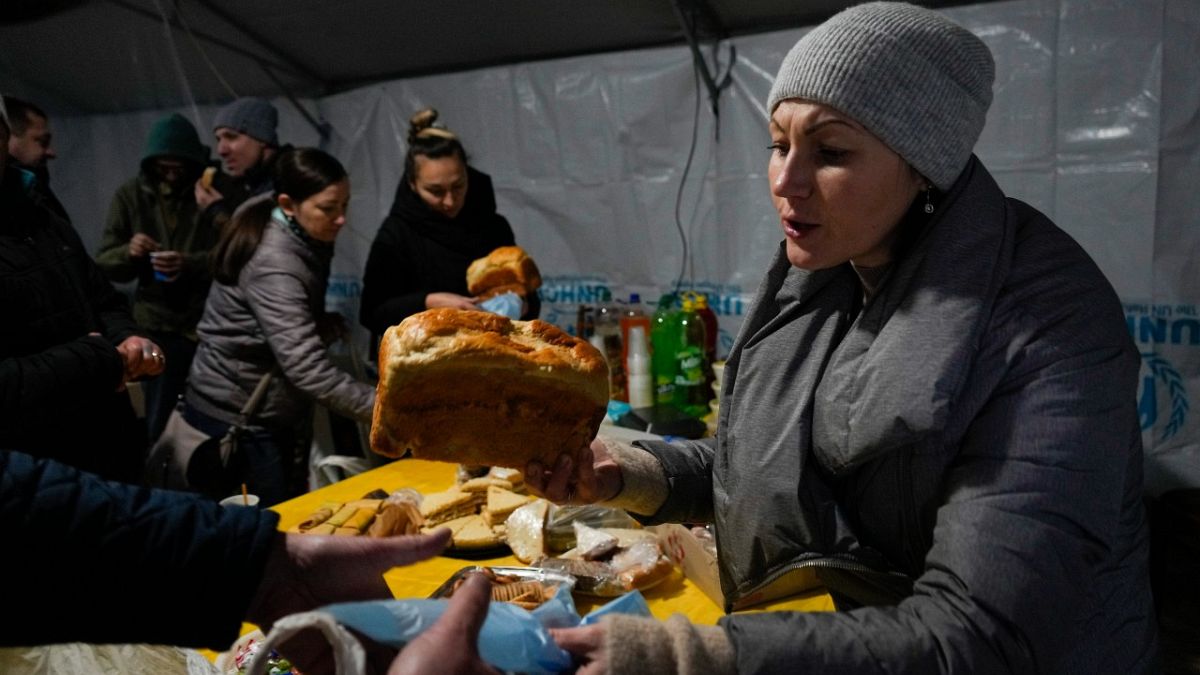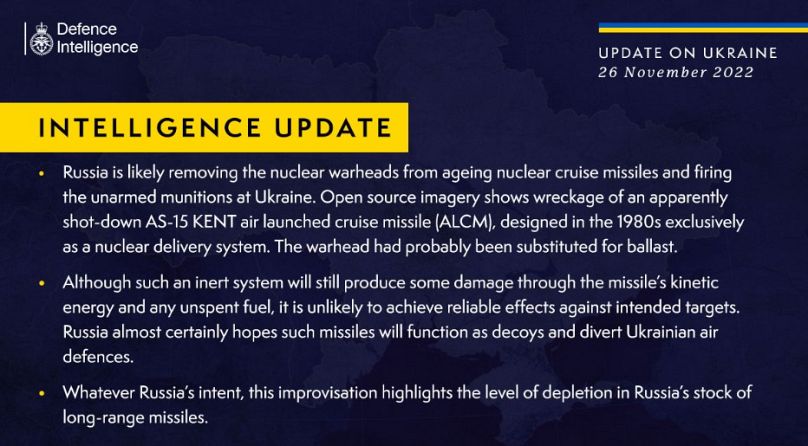Here are the main developments in Russia's war against Ukraine this Saturday.
1. Power 'restored to Kherson' despite Russian attacks
Electricity has been restored in the southern Ukrainian city of Kherson after its liberation earlier this month from Russian occupation, a senior presidential aide said on Saturday.
"First we are supplying power to the city's critical infrastructure and then immediately to household consumers," Kyrylo Tymoshenko, deputy head of Ukraine's presidential administration, wrote on the Telegram messaging app.
Ukrainian forces reclaimed the city on November 11, but Euronews' Anelise Borges reported from Kherson on Friday that there was still no electricity, heating or running water.
Ini recent days, Russian bombing of Kherson has caused many casualties. The authorities said on Friday that 15 civilians had been killed and 35 wounded, including a child.
Galyna Lugova, an official of the city's military administration, said on social media that several "private houses and high-rise buildings" had been damaged.
"The Russian invaders opened fire on a residential area with multiple rocket launchers. A large building caught fire," Yaroslav Yanshevich, governor of the Kherson region, said earlier. "Due to the constant Russian shelling, we are evacuating patients from hospitals in Kherson."
Residents have been fleeing the city to the north and west to escape the attacks, seen as Russian retribution for Ukraine's liberation of the city.
The Ukrainian Ministry of Reintegration of Temporarily Occupied Territories said in the evening that a train had left Kherson for Khmelnytskyi "with the first 100 citizens of Kherson who benefited from the government evacuation, including 26 children, seven bedridden patients and six disabled people".
The Russian withdrawal from Kherson, which Moscow had hoped to make its base in occupied southern Ukraine, has reshuffled the cards in the nine-month-old war. The city is strategically located to link the Crimean peninsula, annexed by Russia since 2014, and the Ukrainian port of Odesa to the west.
2. Six million still without power after Russian attacks, says Zelenskyy
Ukrainian President Volodymyr Zelenskyy said late on Friday that the number of people without power had been halved since the immediate aftermath of Russia's assault this week.
But, he added, some six million were still cut off.
In his nightly video address, he pleaded with Ukrainians to use energy sparingly. "If there is electricity, this doesn't mean you can turn on several powerful electrical appliances at once," he said.
Kyiv -- with some 600,000 homes without electricity in the evening -- and its region, as well as the provinces of Odesa in the south, Lviv and Vinnytsia to the west, and the central city of Dnipro, are the most affected by the cuts, Zelenskyy added.
The authorities on Friday gradually restored power on Friday, aided by the reconnection of the country's four nuclear plants.
But the Russian attacks earlier in the week caused the worst damage so far in the conflict, leaving millions of people with no light, water or heat even as temperatures fell below zero.
National power grid operator Ukrenergo said several hours earlier that 30% of electricity supplies were still out, and asked people to cut back on their energy use. "Repairs crews are working around the clock," it said in a statement on Telegram.
Zelenskyy went to the town of Vyshhorod just north of Kyiv on Friday to look at a four-storey building damaged by a Russian missile. He also visited one of the many emergency centres that have been set up to provide heat, water, electricity and mobile communications.
"Together we will be able to go through this difficult path for our country. We will overcome all challenges and we will definitely win," he said earlier.
3. Europe scrambles to help Ukraine keep heat and lights on
European officials are scrambling to help Ukraine stay warm and keep functioning through the bitter winter months.
It's estimated that around 50% of Ukraine's energy facilities have been damaged in the recent Russian strikes targeting Ukraine’s power grid and other critical civilian infrastructure.
The European Union will step up efforts to provide Ukraine with support to restore and maintain power and heating, European Commission President Ursula von der Leyen said on Friday.
France is sending 100 high-powered generators to Ukraine to help people get through the coming months, French Foreign Minister Catherine Colonna said on Friday. She accused Russia of "weaponising" winter and plunging Ukraine’s civilian population into hardship.
Finnish economy minister Mika Lintila said Finland may send the first batch of energy equipment to Ukraine next week. Companies had overwhelmingly responded positively to a request for donations, he said on Twitter.
Belgium is to provide additional financial support of €37.4 million for Ukraine, according to the Belga news agency.
This week European officials launched a scheme called “Generators of Hope,” which calls on more than 200 cities across the continent to donate power generators and electricity transformers.
The generators are intended to help provide power to hospitals, schools and water pumping stations, among other infrastructure, but may provide only a tiny amount of the energy that Ukraine will need during the winter.
International human rights officials say Russia's claims that it does not target civilians are difficult to reconcile with attacks on civil infrastructure.
"Millions are being plunged into extreme hardship and appalling conditions of life," UN human rights chief Volker Turk said in a statement.
UK Foreign Secretary James Cleverly, visiting Kyiv, said a promised air-defence package, which Britain valued at £50 million (€58 million), would help Ukraine defend itself against Russia’s bombardments.
“Words are not enough. Words won’t keep the lights on this winter. Words won’t defend against Russian missiles,” Cleverly said in a tweet about the military aid.
The package also includes 24 ambulances and 11 other emergency vehicles, some of them armoured.
German Chancellor Olaf Scholz announced in a video an additional €10 million in aid to support Ukrainian grain exports, which have been affected by the war.
4. Russia 'likely using old cruise missiles without nuclear warheads'
Moscow is probably removing nuclear warheads from old cruise missiles and firing the unarmed munitions at Ukraine, the UK defence ministry says in its latest intelligence update on the war.
Open source imagery shows wreckage of a cruise missile, designed in the 1980s as a nuclear delivery system, that had been shot down, the ministry said in a post on Twitter.
"Such an inert system... is unlikely to achieve reliable effects against intended targets," it adds. "Russia almost certainly hopes such missiles will function as decoys and divert Ukrainian air defences."
"Whatever Russia's intent, this improvisation highlights the level of depletion in Russia's stock of long-range missiles," the bulletin concludes.
5. European leaders visit Kyiv to commemorate Holodomor
Several European leaders travelled to Kyiv on Saturday for the annual commemorations of the Soviet-era famine of the 1930s known in Ukrainian as the Holodomor, which Ukraine considers "genocide" committed by Stalin's forces.
The prime ministers of Poland and Lithuania, Mateusz Morawiecki and Ingrida Simonyte, were also due to use the visit for talks about a possible new wave of immigration of Ukrainians to Europe this winter, reports said.
The Ukrainian border guard service confirmed that Morawiecki had "visited Kyiv and honoured the memory of the victims of the Holodomor".
Belgian Prime Minister Alexander De Croo also visited the Ukrainian capital, his first trip there since the start of the Russian invasion.
De Cross and Zelenskyy signed a declaration of support for Ukraine's membership with the EU and NATO.
The 90th anniversary of the famine known that left millions of Ukrainians dead during the winter of 1932-33 has taken on new resonance since the Russian invasion.
Ukraine's foreign ministry accused the Kremlin on Saturday of using the same "genocidal" tactics that it used against it in the 1930s under Josef Stalin.
"The Russians will pay for all of the victims of the Holodomor and answer for today's crimes," Andriy Yermak wrote on Telegram.
In November 1932, Soviet leader Joseph Stalin dispatched police to seize all grain and livestock from newly collectivised Ukrainian farms, including the seed needed to plant the next crop.
Millions of Ukrainian peasants starved to death in the following months, in what some historians have called premeditated mass murder.
The German parliament is to debate a resolution, tabled by the ruling coalition, next week to recognise the famine as a "genocide".



